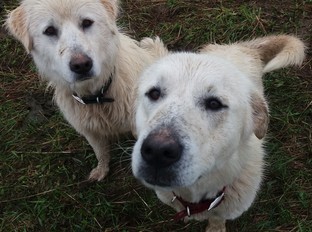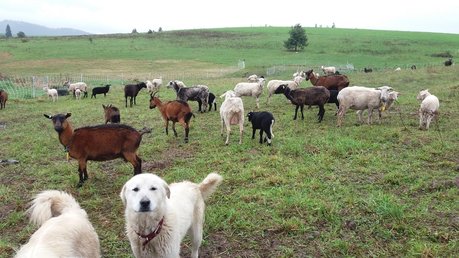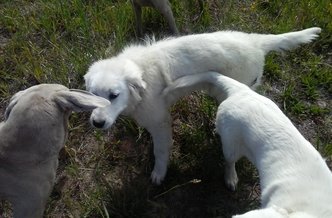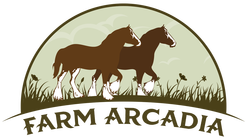 They don't like the rain and mud, but they are good at ignoring it. They don't like the rain and mud, but they are good at ignoring it. We've owned dogs since we were first married, and both of us owned dogs before that. We quite like the Weimaraner breed, but have also owned a Jack Russell terrier, Chihuahua-rat terrier mixes, and before getting married we've lived with English pointers, beagles, terrier mixes, border collie, and mutts. We've seen some breeds are smarter than others. Our Jack Russell was extremely smart, troublingly so, and trained very easily. Our Weimaraners are not as smart, but very interested in pleasing. This has made them easy to train. Our dogs live in the house with us with the exception of our guardians (livestock guardian dogs, often called LGDs). After having owned and trained many dogs, it is apparent these are very different than others, so much so we have come to refer to "the dogs" as one group and "the guardians" as another. They are so different! And, I'm not being dramatic ... I'm not a dramatic person, but quite the opposite. If thinking about getting a livestock guardian dog, please take warnings and advice from others seriously to avoid a bad situation for you and the dog. Just to say it up front, I do not recommend Akbash dogs as a pet for anyone. Great Pyrnees might be okay in the right setting with the right family ... might. TrainingFirst thing I noticed is that they do not train easily. The more Pyrenees-like dog warmed up to me immediately and I was hers and she was mine. The other resented us for the first couple of weeks as she gradually warmed up. Now she is eager and happy to see us, but she does not view us as her masters. They both know their names, which they learned very quickly. When I gave them the command to sit, I would sit them down and then reward them. I repeated this 20 times and they seemed to get it only here and there. When I talk to dogs I'm training, they usually look back at me with very attentive eyes, especially if I'm giving out treats. The guardians didn't do this. I started wondering if they were dumb, but they aren't. It seems to me that it's more of their nature that's coming through - they aren't focused on me but are taking in everything in their surroundings. I wasn't the sole focus of their attention. Training wasn't their priority. They are very smart and interested in doing their jobs (guarding), which sometimes does not involve obeying my commands. Still, they trained. They both know how to sit, come, and leave it. Whether they want to do it or not is another story (leave it brings swift punishment for disobeying such as getting tackled to the ground and pinned on their back). With all of my other dogs, when they were trained a command, they didn't consider every time whether or not they felt like doing it. Guardians do. Come is a hard one. If they feel the need to track down the coyote that left the smell trail through the farm, that is WAY more important than coming. When I take them out with me to do chores, I tie a rope around my waist and to them so they learn to stay with me. I haven't taught them to shake or jump through hoops. I probably never will. They know to sit, come, lie down, and leave it (which is to stop chasing a chicken or bouncy goat kid). That will probably be the extent of it. They are very smart, but they are very independent. That's what they've been bred to be, though. If thinking of one of these dogs as a pet, this can make them very frustrating. Be prepared for this! They Guard (& Bark) Fortunately, bad weather does not make them irritable or act differently towards the livestock. Fortunately, bad weather does not make them irritable or act differently towards the livestock. The guarding instinct is STRONG. My friendlier dog is also my more aggressive dog. She'd love to play with the goats, but if a Weimaraner strolls up to join in the fun, it's fighting time. One dog has bonded better with the sheep and is less rambunctious than the other. When the more playful one wants to play with the sheep, the other is ready to fight her off, and they are sisters. Even though they are friendly intelligent dogs, they are bred to be aggressive and possessive. This is part of how they guard. They want to drive away and kill coyotes, wolves, bears, and other dogs. One of them is also crazy for hawks and anything of size that flies even though both of them chase away birds. The first part of guarding is barking. They bark a lot if they perceive threats. Threats may be other dogs, deer, elk, coyotes, strangers, etc. My dogs are friendly to people I introduce to them, but not to everyone who comes by. This is important to keep in mind if there are many people who come by your place. I like it because they will deter human trespassers, which we have previously had damage our property. They Escape & RangeEighty acres is not as large as my young dogs naturally want to range. They will go miles. They climb fences that keep in all other animals. They go under fences. They are also amazingly tough and will take a shock from an electric fence to get to where they want to go. They need space! If you live in an apartment or house without a large yard, these are not for you. Even if you have a large yard, I don't think they're a good fit unless you walk them a lot daily. (They don't play fetch.) Then need to patrol. Fencing should also be very secure. They will work latches and handles to get out. They are amazingly persistent and very smart! I will admit that my guardians have had to be chained ... I hate chaining out dogs and don't do it normally. In this case, though, they were a hazard. They were visiting neighboring farms and chasing poultry and cats. Some of the farms were across a highway (at risk for getting hit by a car). They escaped from livestock paddocks and a kennel even with drags on (a heavy chunk of wood on a short chain connected to their color to deter some escaping activity). Surprisingly, I have a simple portable electric fence that has worked wonderfully at keeping them in. I think it's partly that their desire to escape has lessened and the fence isn't sturdy enough to climb. I don't know, but everyone's happier with the discovery it works. They're NocturnalI think our dogs must seem lazy as most LGDs do. They lay around sleeping all day, but they are busy all night. Ours bark half the night because we have so many coyotes and other wildlife nearby. They run patrols and, if they could, would chase down predators and hunt deer. I don't know if they would switch to our schedules if kept in a family setting, but I hear they still try to patrol at night. Perhaps it depends on the individual guardian. Whatever the case, LGDs are naturally nocturnal. Puppyhood Is Long Our guardians' puppyhood lasts longer than other dogs, even our other large breeds. One was excellent with livestock before she was a year. The other was too bouncy and playful to be trusted until much older than that. They are amazingly rough and tough when they play. They bite hard, tackle hard, roll and wrestle, and have big paws they swipe with hard. Their skin is tough (I can tell when I give injections) and stands up well to the biting and fighting. Their ranging habits ... I hear conflicting stories about if that is a puppyhood behavior. Some have told me it subsides after two or three years. Others have told me that their LGD who is getting old still ranges through a 100 square mile area she claims as her territory. Guardians are usually very large dogs and grow rather slowly. They need high quality high protein diets. I keep ours on puppy-type food or BARF-type diets always as they have a tendency towards leanness. LGDs Live Longer in GroupsIf you are getting a guardian to protect livestock and you have real threats around you, getting more than one extends the life of the guardian. One dog should not be charged with more than 100 head of anything, and that includes population explosions in the spring. Coyotes in our area are extremely cunning and bait out dogs with play or chasing and then attack the tendons in their back legs. A single dog is much more easily encircled and taken down. They are also more easily baited by a coyote or wolf of the opposite sex. By having more than one gender, intact or neutered/spayed, both guardians won't be baited in by the same hotty-body-coyote or wolf. If introducing new dogs to an existing farm or group, you will likely need to introduce the new ones as pups who will submit to the existing dogs. Hierarchy is very important and can result in fatal fights if disrupted or if new guardians are introduced incorrectly. My understanding is that girls tend to fight more viciously with each other. Family members are less aggressive and parents-pups are good combinations. Be sure to spay and neuter to prevent inbreeding. We Love Our GuardiansWe definitely love our guardians. They can be destructive and noisy at night, but we have learned to trust them. They have saved the lives of our sheep and goats. They give us a friendly warm greeting whenever we go out to our animals. They investigate everything we do (put their face in the middle of it) and want to be aware of everything that goes on. While I do not plan to keep them in the house, I see the temptation but I also see how destructive they would be because of their nature. Ours are happier outside where they can keep tabs of everything that is going on.
If you are looking to acquire one as a pet or guardian, please see my resources section for a good book that helps understand some of the nuances of guardians. Adopting rescued adults is certainly a good thing to consider, but if getting them for guarding, be sure to research a lot about why they are being rehomed and how to get them to bond with you and your farm. (Some LGDs have hurt livestock, so you may be in for time-consuming retraining.) They are amazing animals and I hope you have a rewarding experience with yours.
2 Comments
4/10/2024 12:52:18 am
Your blog on considerations before getting a guardian is incredibly informative and helpful! I appreciate the thoroughness of your content and how you've covered all the essential aspects one needs to consider. Your dedication to providing valuable insights truly shines through.
Reply
4/10/2024 03:15:06 am
what an incredibly informative and helpful blog post! Thank you for taking the time to share such valuable insights and considerations before getting a guardian. Your expertise shines through, and I'm sure many readers, like myself, will benefit greatly from your knowledge. Keep up the fantastic work!
Reply
Your comment will be posted after it is approved.
Leave a Reply. |
Mindy HelmsWife to Brandon, mother to Tess and Liam, farmer, entrepreneur, cook & baker, nurse, and accountant who loves to try new things, travel, and work toward greater self-reliance. Archives
May 2024
Categories
All
|

 RSS Feed
RSS Feed
